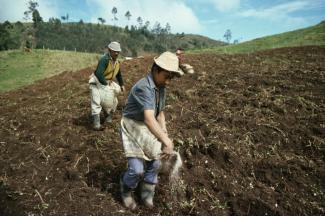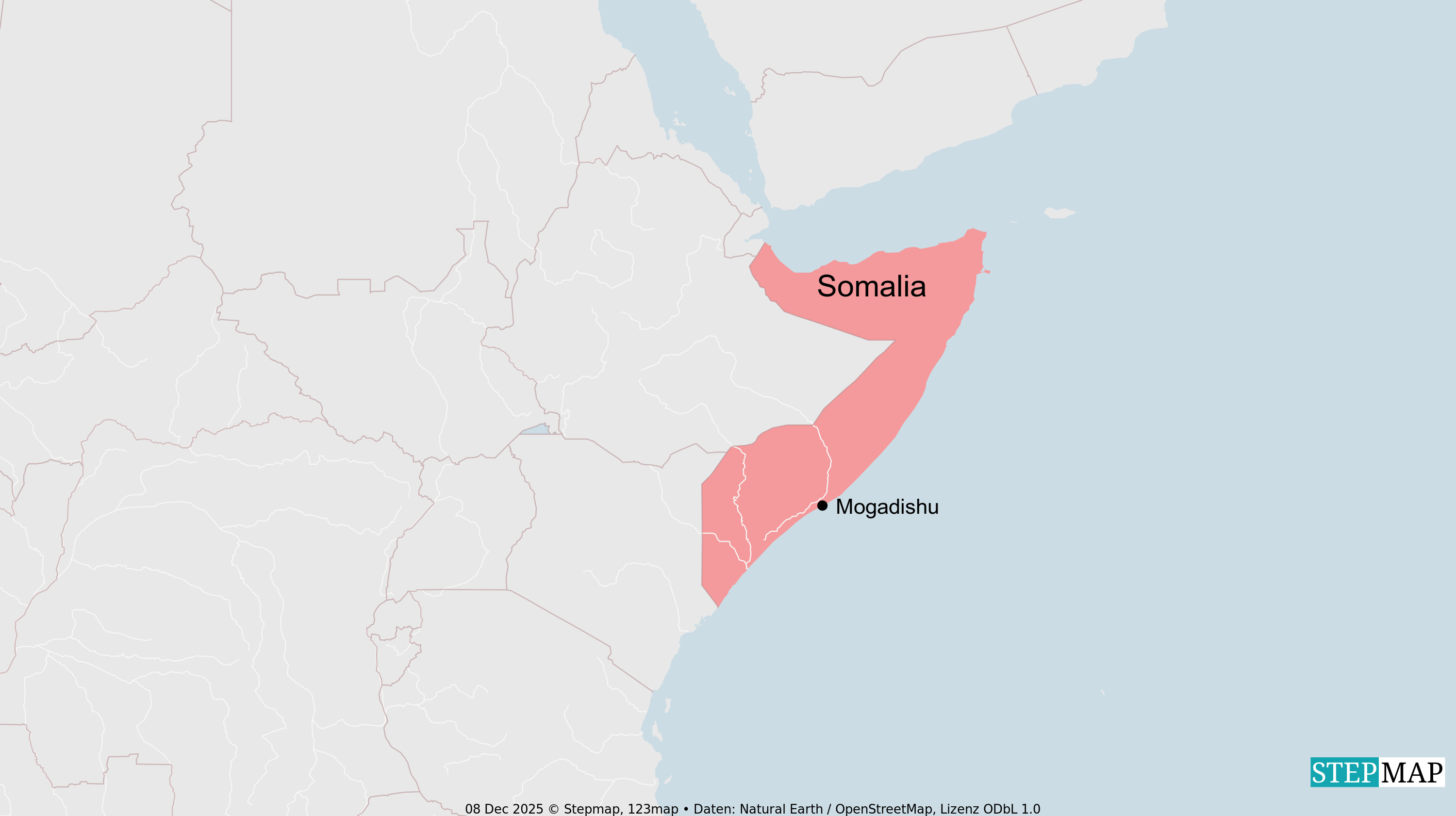Victim compensation
Returning to everyday life

What is the best way to help the victims of Colombia’s civil war to reintegrate into rural communities’ social and economic life? In the Caldas region in central Colombia, a research team has looked for answers, and the scholars from Berlin’s Humboldt University and the Colombian Autonomous University of Manizales (UAM) have came up with some proposals. They suggest:
- strengthening local markets,
- providing psychosocial support for victims and
- improving coordination between farmers’ associations and groups of victims.
The study was commissioned by GIZ in cooperation with the regional government.
The approach proposed by the scholars can also prove useful in other parts of Colombia. Communities across the country will face the question of how to support victims’ reintegration into normal life.
As one-size-fits-all policies normally do not succeed, attention must focus both on the specific economic potential of every region as well as to the specific circumstances of the people who were affected by war and displacement. Dialogue between local governments, business leaders and victim groups is indispensable.
For many years, this understanding has guided the efforts of GIZ’s CERCAPAZ programme, which promotes dialogue between civil-society groups and state institutions. The goal is to cooperate on drafting sustainable peace strategies with locally-specific solutions. In line with Colombia’s national peace agenda and taking local specifics into account, the programme focuses on victims participation and reparation, citizens’ security and peaceful coexistence.
Because rural Colombia is quite diverse and the victims of the war are a most heterogeneous group, there is often a lack of reliable information, which in turn makes it difficult to draft well-targeted strategies. Responding to this challenge, the scholars analysed the regional economy and assessed the victims’ situation.
The area under investigation comprises Marquetalia, Norcasia, Pensilvania and Samaná, four municipalities in the eastern part of the Caldas department. Armed conflict is largely a thing of the past in this rural areas, so it was possible to do research.
Caldas is a coffee-producing region, and coffee continues to be among its most important agricultural products. Cocoa, avocados, plantains, sugar cane and natural rubber are also cultivated. In some places, extensive livestock farming and forestry play a role too. Beyond agriculture, there are very few sources of income.
Colombia has lately been importing more food, and this trend is putting significant pressure on the domestic agriculture, which is acutely felt in Caldas. Farms are becoming less and less profitable because of poor infrastructure, high transport costs and the dependence on middlemen. In 2013, small farmers from across the country aired their grievances in one of the largest social protest movements that Colombia had seen in years.
Civil-war victims living in Caldas are in a similarly precarious situation as rural Colombians in general. Unlike their neighbours, however, only few displaced people own enough cultivable land to regain a foothold as farmers. Moreover, it is common for victims to have become dependent on state aid, the indiscriminate distribution of which has ultimately kept them from taking individual initiatives to improve their situation.
It compounds problems that, lacking psychosocial support, many people are still struggling to cope with traumatic war experiences. The victims tend to withdraw from social live and hardly participate in public affairs. Their mental suffering typically keeps them from developing an entrepreneurial spirit.
What difference the farmers’ market makes
The crucial question, therefore, is what will make all actors cooperate on solutions. Especially in rural areas, it is essential that agriculture and trade flourish at the local and regional levels. In view of this need, the municipal administration of Pensilvania has set up the “mercado libre campesino” in cooperation with local producer organisations and interest groups. This farmers’ market has become a space for the marketing of local goods in the town centre.
For years, goods brought in from Bogotá dominated the local market, even though local producers could have satisfied the local demand. Because of high production and transport costs, poor quality and rather volatile supply, local products were hardly on offer however. Moreover, there is a general sense of distrust in crisis regions, and people are especially cautious in regard to others. This attitude can thwart normal market activity to a considerable extent.
Thanks to the “mercado libre campesino”, many small farmers are now selling their products directly without having to rely on intermediaries. For the first time, there is a suitable trading platform for regionally-grown products, and consumers are becoming aware of them. Personal contact and direct exchange between growers, consumers, traders and producer associations help to build mutual trust.
Furthermore, the market has created a space for new ideas to develop. For instance, a young family is now selling its unique yoghurt creations to a wider public, instead of tediously trying to market products door-to-door.
Psychosocial support
The trauma people suffered in the war still affects them psychologically. In order to deal with their experiences, they need professional help. Projects aimed to support war victims should include psychosocial support. In addition to individual counselling, collective approaches matter because they foster social cohesion.
Sol Naciente, a private foundation, is doing impressive work in this area, exemplifying what it means to come to terms with wartime trauma. Arts and cultural activities allow people to gain self-confidence, experience joy and feel hope for the future once again. A dance school led by Layla, a belly dancer, is at the centre of activities. Her class is extremely popular and attracts about 300 dance students.
Layla offers dance lessons both in urban Pensilvania as well as in rural areas that were hit particularly hard by the civil war. Her classes serve a clear psychosocial function. The protected space of shared dance lessons helps people regain their dignity. As they refind themselves in dance and self-expression, they begin to muster the strength needed to become involved in social life once again.
Meeting at eye-level
The establishment of a local farmers’ market may seem trivial, and the need to provide psychosocial care in crises and (post-)conflict regions may seem obvious. Difficult circumstances and a torn social fabric, that are typical in rural Colombia, however, mean that these things cannot be taken for granted. Moreover, these issues are interrelated and must be considered in context from the very start. Transparent involvement and targeted, but nevertheless open-ended dialogue between all relevant interest groups are among the basic building blocks for any meaningful reparation strategy.
In the course of the research, it became evident again and again that mutual distrust, a poor understanding of other people’s interests, lack of expertise and poorly defined responsibilities can nip inklings of social inclusion in the bud. Although many registered victims are organised in associations, only a few members actually assume active roles and engage in interaction with other parties. It depends largely on their representatives, however, whether victims’ needs are successfully communicated.
Victims rarely participate in substantial decision-making processes that would allow them to actively shape their socio-economic environment. Making matters more difficult, cooperation remains limited among local farmers. Their associations exist primarily to express their interests, rather than to organise joint efforts. The result is a failure to implement specific, shared marketing strategies.
The local government could make a difference by improving the conditions for public participation. If victims’ socio-economic potential is recognised and other relevant actors are able to take part in realising it, reparation will come within reach.
Gregor Maaß works as a consultant and trainer with an emphasis on conflict transformation and peacebuilding.
kontakt@gregor-maass.de
Mario Pilz conducted research in Colombia in 2013 on behalf of the Centre for Rural Development (SLE) of Humboldt University Berlin and GIZ. He is currently involved in programme coordination for Welthungerhilfe in Pakistan.
mariopilz@gmx.net
Link
Maaß, G., Montens, K., Hurtado Cano, D., Molina Osorio, A., Pilz, M., Stegemann, J., Guillermo Vieira, J., 2013: Entre reparación y transformación: Estrategias productivas en el marco de la reparación integral a las víctimas del conflicto armado en el Oriente de Caldas, Colombia. Berlin (in Spanish).
https://www.sle-berlin.de/files/sle/auslandsprojekte/2011/2013_Kolumbien_mit%20Cover.pdf







